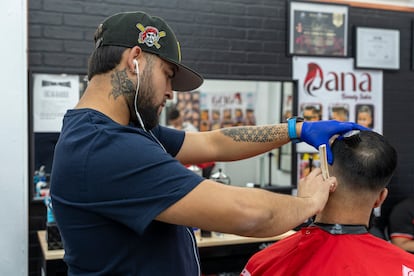In January, just days after Donald Trump was sworn in as president, immigration agents came to Dana Beauty Salon in Mount Rainer, Maryland, located just two minutes from the Washington D.C. border. They were looking for one of the employees, an undocumented migrant, who was taken into custody and is being held at a detention center in New Hampshire pending a court hearing. That day changed the life of the salon’s owner, Daysi García. “They showed up one day, I think it was a Thursday. By the time the weekend came around, no one was coming in, our workers weren’t coming in for their shifts, not even the clients were coming in,” she recalls sadly.
García is yet another victim of the anti-immigration crackdown set in motion by the Republican president, who is intent on carrying out the largest deportation campaign in the history of the United States. They’re not the ones in handcuffs, nor do they fear being boarded onto a plane with an uncertain destination, but many owners of businesses frequented by Latinos are living a nightmare. They’ve lost their clientele, who are afraid to leave their homes — and sometimes, they’ve even lost their employees.
The majority affected are at the helm of small Latino-run businesses. Located in majority-Latino neighborhoods, they often offer services and products that are typical of their countries of origin, and Spanish is often the most common language used on the job. Many own restaurants and beauty salons, which have been the most impacted by fall in clientele, alongside grocery stores, service providers like party planners and craftspeople.
“What is happening now is worse than what we experienced during Covid. Back then, people could put on a mask and come in. Now, they don’t even want to leave their homes,” says García.
In the eight years that she’s owned the salon, the Salvadorean has never seen anything like it. Just two months ago, five employees attended an average of eight to 10 people per day. Now, three employees receive a maximum of three clients per day. She admits that she’s extremely concerned about the future of her business.
“I’m worried about ending up on my own when the people who work for me leave, or having to close because there are no clients. How would I be able to pay $3,000 to stay open if no one comes in?” Last Tuesday, U.S. Immigration and Customs Enforcement (ICE) agents showed up at some nearby apartments and took four of her regular customers.
Domino effect
Percy Pelaez-Contti, president of the Central American Chamber of Commerce in Houston, explains that the damage to Latino businesses has been immense and is due, above all, to what he calls “the domino effect.”
“Some people have their papers in order, but they are still afraid. They think, what happens if it also affects legal residents, or even citizens, etcetera, etcetera? They start with the people who haven’t sorted out their documents, but it also impacts those close to them,” he says.
The U.S. government claims that its deportation campaign is only directed at undocumented immigrants who have committed crimes, a stance that helped Trump gain the trust of many Latinos during last year’s elections, as they believed that, since they had no criminal record, they had nothing to fear. But the reality has turned out to be much different. Many of the migrants detained haven’t committed any crime, aside from entering the country without proper documentation. This, coupled with the termination of programs that until now, protected certain migrants from being deported, such as the Temporary Protection Status and humanitarian parole, is spreading fear through immigrant communities.
“When a grenade is thrown, what kills you is the shrapnel or the surrounding explosion. That’s the same as what’s happening,” says Pelaez-Contti. “I mean, they come and grab 10 people and 100 people, OK, but it’s not just 10 people or 100 people, it’s also 10,000 people around them who are being affected,”
Pelaez-Contti says that ICE agents recently entered a hair salon in the PlazAmericas mall in southeastern Houston, a hub for the local community that is home to Honduran restaurants, Mexican dance clubs, jewelry and furniture stores and other Latino businesses. The salon’s owners would not give statements to the press or even give the name of the establishment out of fear. ICE agents were looking for a specific employee, but took advantage of their visit to ask for identification from everyone present. Various people were detained. This highlights the collateral damage that can occur when immigration agents are authorized to detain undocumented immigrants who were not their original target.
In addition, local authorities can now access the ICE database of individuals with existing deportation orders, which facilitates collaboration between local law enforcement with immigration agencies.
Throughout the United States, there are some 12 million undocumented migrants, who make up 5% of the workforce, according to the Migration Policy Institute.
Pelaez-Contti estimates that small Latino establishments have seen business decline by at least 30% since Trump returned to the White House and began his anti-immigration campaign.
“Corporations have many millions [of dollars] in reserve and can wait for the economic situation to settle down, but small businesses live week to week. What is happening is very intense,” he says. His accounting and financial consulting firm has also been impacted.
“Some clients don’t want to pay taxes out of fear of turning over their information and others see no sense in paying them if they’re going to be deported,” says Pelaez-Contti.
Latinos create more businesses per capita than any other racial or ethnic group in the United States. In 2023, they founded 36% of all new businesses in the country, nearly double their percentage of the general population, according to the McKinsey & Company consulting firm.
The various fronts through which the Trump administration is attacking the migrant population have sown uncertainty, even among those who are legally residing in the country. Small business owners resent the fact that even documented residents fear being arrested when federal agents come to detain undocumented migrants.

‘Get your tacos, tamales…’
The mayor of Minneapolis, Jacob Frey, echoed the concerns of business owners last month. “Minneapolis, we need to support our Latino-owned businesses now more than ever,” he wrote on X. Frey also posted a video in which he is seen visiting various businesses, eating tamales, walking through a central market and buying a Mexican soccer jersey. “I’m asking you to go buy a taco. I’m asking you to go get a tamal. I’m asking you to go buy a beautiful dress at one of these shops,” he says. “It doesn’t just impact them and their families. It impacts all these businesses up and down East Lake that rely on their regular shopping,” the mayor continues.
In another beauty salon in Wheaton, Maryland, owner Krissia Sánchez, who has 10 employees, says that business has fallen 60% in the last two months. Sánchez, who is Salvadorean, founded her business 30 years ago, and 95% of her clientele is Latina. No immigration officer has showed up at her shop, but she sees that her customers are worried. “People are afraid. The ones who come in, talk about the problems that they or one of their family members have had with immigration authorities. And they’re worried about spending money,” she says.
Johanna Madrid has also heard comments from clients, “rumors about the issue from some of the people who come in,” she says, although she adds that the Cuban restaurant at which she is manager, La Esquina del Lechón in Doral, Florida, hasn’t seen any significant drop in clientele. Eighty-five percent of the 80,000-person southern Florida city is Latino. The socioeconomic level in their part of the Sunshine State is upper middle class.
Antonio Quijada, who is manager at the Venezuelan restaurant Panna, which is also located in Doral, says that there haven’t been any detentions in the area, though he has noticed changes in residents’ behavior.
“There still hasn’t been an immediate impact on the flow of people coming into the restaurant. It’s more of an emotional effect. People are very nervous, the clients who we know personally, as well as our employees, are afraid of losing the benefits they have, like TPS. They’re looking for alternatives and we tell them to talk to a lawyer.”
The majority of the restaurant’s 18 employees are Venezuelan and Colombian. TPS is one of the programs the current administration has terminated that once offered legal residence to migrants. Undocumented Venezuelans continue to make headlines after Trump’s government deported nearly 300 of them to El Salvador, ignoring a court order that blocked their removal.
Translation by Caitlin Donohue.
Sign up for our weekly newsletter to get more English-language news coverage from EL PAÍS USA Edition











